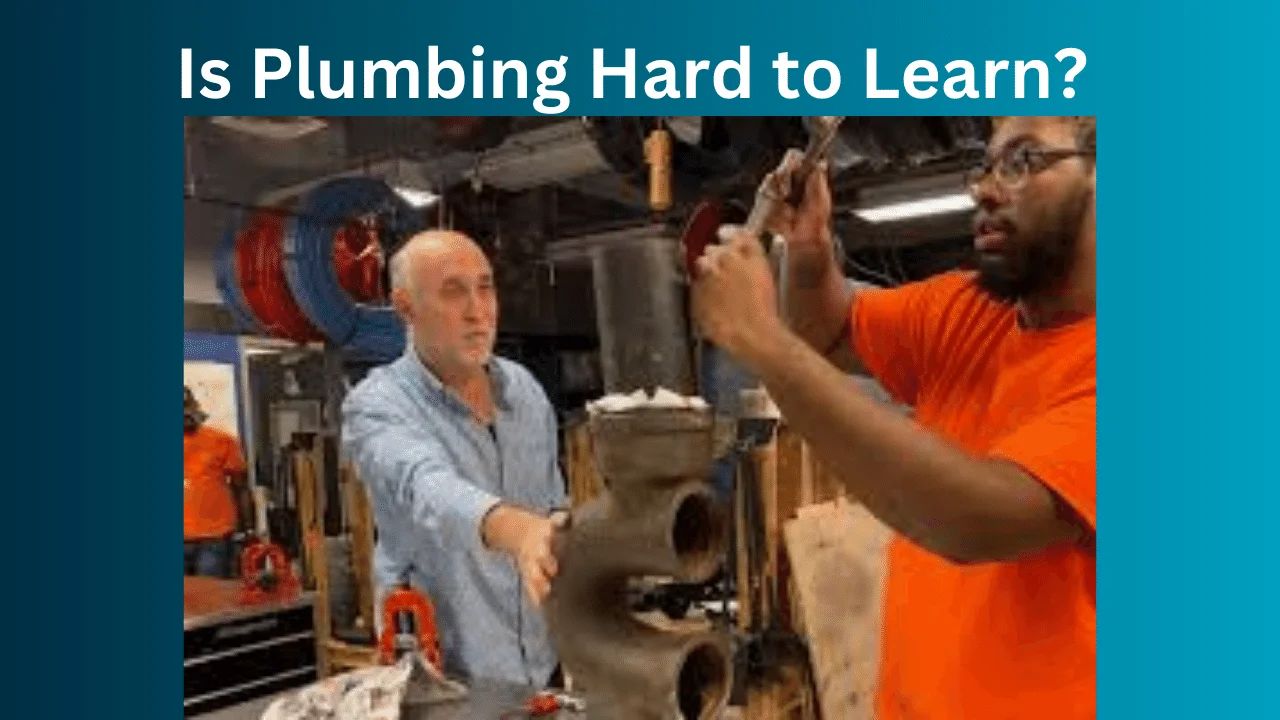The skill of plumbing is essential to contemporary society because it guarantees the security, effectiveness, and comfort of our homes. Is Plumbing Hard to Learn? To help readers better understand what it takes to become a licensed plumber, this article explores the ins and outs of the plumbing education process. Our goal is to give aspiring plumbers and anyone interested in the field a complete overview of the subject, with an emphasis on developing practical skills, understanding regulations, and the need for continuous learning.
Who Should Consider a Career in Plumbing?
People with an aptitude for solving problems, a love of physical labor, and an interest in the inner workings of buildings would do well to consider a career as a plumber. This career path is ideal for individuals seeking a secure job with high demand, room for advancement, and the chance to be their own boss. As plumbing technology and regulations change over time, it is ideal for candidates who prioritize lifelong learning. Also, plumbing is a great profession for those who are up for the challenge of an apprenticeship or trade school.
Understanding Plumbing Basics
Learning the Fundamentals
A thorough familiarity with fluid dynamics, piping materials, and water systems is fundamental to the plumbing profession. The water supply, drainage, and venting systems are the fundamentals of any plumbing system, whether it’s a home or a business. In order to diagnose problems and put effective solutions into action, this background knowledge is essential.
Plumbing Apprenticeship Requirements
Apprenticeships in the plumbing trade provide students with both theoretical knowledge and practical training from more seasoned professionals. Apprentices learn the ins and outs of plumbing systems, including installation, repair, and maintenance, over the course of four to five years of program that is typically structured according to local regulations.
Plumbing Trade School Benefits
A thorough education in the rules, practices, and theories of plumbing is offered by vocational schools. Students can get the foundational plumbing training they need at these schools. Advantages include a well-organized curriculum, familiarity with up-to-date plumbing technology, and practice for licensing exams.
DIY Plumbing Learning Resources
There are a plethora of excellent resources available online for individuals who do not have access to plumbing apprenticeships or trade schools, including tutorials, manuals, and courses. If you’re a homeowner interested in fixing small things or just want to learn the basics before enrolling in a plumbing course, these resources are perfect for you.
Mastering Pipe Fitting Techniques
The goal of precise pipe fitting is to install systems without leaks by precisely measuring, cutting, and connecting pipes. A thorough familiarity with the many piping materials and connection techniques, as well as extensive practice, is necessary to become an expert in this field. Building plumbing systems that are both efficient and safe requires it.
Soldering Skills for Plumbers
When dealing with copper pipes, plumbers must possess the fundamental skill of soldering. A strong, watertight seal is created by melting solder around a joint using a heat source. The stability and dependability of plumbing systems depend on the soldering technique, which demands precision and control.
Plumbing System Design Principles
In order to ensure that systems are efficient, safe, and in compliance with regulations, it is critical to understand the principles of plumbing system design. Understanding water pressure, venting’s significance, and how to plan systems for efficient flow and drainage are all part of this.
Adapting to Plumbing Challenges
From fixing outdated systems that don’t meet current standards to solving complicated installation issues, plumbing can be a real challenge. Plumbers that excel at their craft are quick thinkers who can solve problems in novel ways.
Plumbing Problem-Solving Strategies
To solve plumbing problems effectively, one must follow a systematic process that includes identifying the problem, determining its source, and then fixing it. This set of abilities is honed through extensive training and familiarity with plumbing systems and typical problems.
Continuous Learning in Plumbing
Plumbing is a dynamic profession because new rules, materials, and technology are always appearing. If they want to give their customers the best service possible and keep up with industry standards, plumbers need to make learning a priority. This can be achieved through participating in seminars, enrolling in more classes, or studying on one’s own.
Potential for Advancement in the Plumbing Industry
Plumbing is an adaptable trade that can lead to many different jobs, from fixing and servicing homes to designing and installing systems for businesses and industries. Skilled plumbers have several career paths to choose from, including becoming supervisors, starting their own businesses, or specializing in green plumbing or water treatment, among others.
Practical Plumbing Skills Development
For aspiring plumbers, getting their hands dirty is the best way to put what they’ve learned in the classroom into practice. Learning the ins and outs of various plumbing systems, honing your tool skills, and taking on a wide range of projects are all great ways to hone your practical abilities.
Theoretical Knowledge in Plumbing
Possessing both practical and theoretical knowledge of plumbing systems, materials, and principles is crucial. With this information in hand, plumbers can solve problems effectively and create, install, and maintain systems that adhere to all codes and regulations.
Becoming a Skilled Plumber
It takes a combination of classroom instruction, practical experience, and lifelong learning to become a competent plumber. It calls for perseverance, persistence, and a readiness to face the inevitable difficulties. Nevertheless, for individuals who are truly dedicated to the trade, plumbing provides a fulfilling career path with plenty of room for progress.
Navigating Plumbing Education Paths
Essentials of Plumbing Fixtures
Any plumber worth their salt knows that there is a vast array of plumbing fixtures. Appliances such as sinks, toilets, showers, and others fall under this category. Installation and repair procedures for each type are unique. Being up-to-date on all the latest fixtures also gives plumbers a leg up when it comes to offering their clients upgrades and improvements.
Building Plumbing Expertise
Years of practical experience and ongoing education are the foundations of plumbing expertise. This involves being well-versed in both the theoretical and practical components of the job, as well as keeping abreast of developments in related fields. Professional plumbers are in high demand for jobs that require a lot of plumbing work and can charge more for their services.
Plumbing Manual and Online Tutorial Benefits
Plumbers of all experience levels can benefit greatly from manuals and online tutorials. You can quickly find installation instructions, specifications, and troubleshooting steps for different systems and fixtures with their help. Those who want to specialize in a particular area of plumbing or who have taught themselves the trade will find these materials invaluable.
Understanding Plumbing Regulations
Plumbers are legally obligated to adhere to all applicable federal, state, and local plumbing codes. The efficacy and security of plumbing systems are guaranteed by these rules. You can’t pass inspections or stay out of legal trouble if you don’t know and follow these rules.
Troubleshooting Common Plumbing Issues
It is an asset for any plumber to be able to swiftly and accurately diagnose typical plumbing problems. For example, there might be pressure issues, leaks, or obstructions. You need to know your plumbing system inside and out and be able to think quickly on your feet to be a good troubleshooter.
Opportunities in Professional Plumbing
Career Opportunities in Plumbing
Industrial, commercial, and residential properties all have a need for qualified plumbers. A career in plumbing can take many forms, from that of an employee to the owner of one’s own company. Additionally, new opportunities arise when one specializes in green plumbing or water treatment.
Certifications Necessary for a Professional Plumber
Possessing a valid certification can do wonders for a plumber’s reputation and employment opportunities. A plumber’s dedication to their work and respect for industry norms are shown by their certifications. One way to break into niche markets in the plumbing industry is to get specialized certifications.
Developing Problem-Solving Skills in Plumbing
Plumbing is essentially about finding solutions to problems. Case studies, mentorship, and practical experience are the three main ways to hone these abilities. When faced with unforeseen obstacles, plumbers who adopt a problem-solving mentality are better equipped to find effective solutions.
Latest Trends in Plumbing Technology
It is critical for contemporary plumbers to keep up with the newest developments in plumbing technology. Things like smart home plumbing systems, water-saving fixtures, and eco-friendly plumbing solutions fall into this category. Being up-to-date on these trends enables plumbers to provide clients with innovative solutions.
Preparing for a Plumbing Apprenticeship Interview
If a plumber does well in their apprenticeship interview, their career could take off. One should familiarize themselves with the company, the fundamentals of plumbing, and demonstrate a desire to learn and advance in the industry as part of their preparation. The interview is your chance to show that you have a strong work ethic and that plumbing is something you really want to do.
Frequently Asked Questions
How long does it take to learn plumbing?
The time it takes to learn plumbing can vary, but a typical apprenticeship lasts 4-5 years.
Can you teach yourself plumbing?
Yes, it’s possible to teach yourself plumbing basics through manuals, online tutorials, and DIY projects, but professional training is recommended for complex work.
What are the biggest challenges in learning plumbing?
The biggest challenges include mastering the practical skills, understanding complex systems, and staying updated with regulations and new technologies.
How to start a career in plumbing with no experience?
Starting a career in plumbing without experience often begins with an apprenticeship or enrolling in a trade school to gain both knowledge and hands-on experience.
What are the most important tools for a beginner plumber?
Important tools for a beginner include wrenches, pliers, a pipe cutter, a hacksaw, and a plunger, among others.
Conclusion
Finally, for those that are ready to put in the work to become an expert, plumbing is a rewarding career path despite its difficulties. Is Plumbing Hard to Learn? Aspiring plumbers can build a rewarding career that significantly impacts society’s comfort and safety through a mix of formal education, practical experience, and continuous professional development.

Shannon Reyes is a seasoned writer with a knack for crafting engaging blogs on a variety of service industries, including plumbing, cleansing, moving, pest control, and roofing. With a keen eye for detail and a passion for helping readers navigate complex topics, Shannon brings her expertise to life through informative and accessible content.












Your point of view caught my eye and was very interesting. Thanks. I have a question for you. https://www.binance.com/da-DK/register?ref=V3MG69RO
Thanks for sharing. I read many of your blog posts, cool, your blog is very good.
Thanks for sharing. I read many of your blog posts, cool, your blog is very good. https://accounts.binance.info/bg/register-person?ref=V2H9AFPY